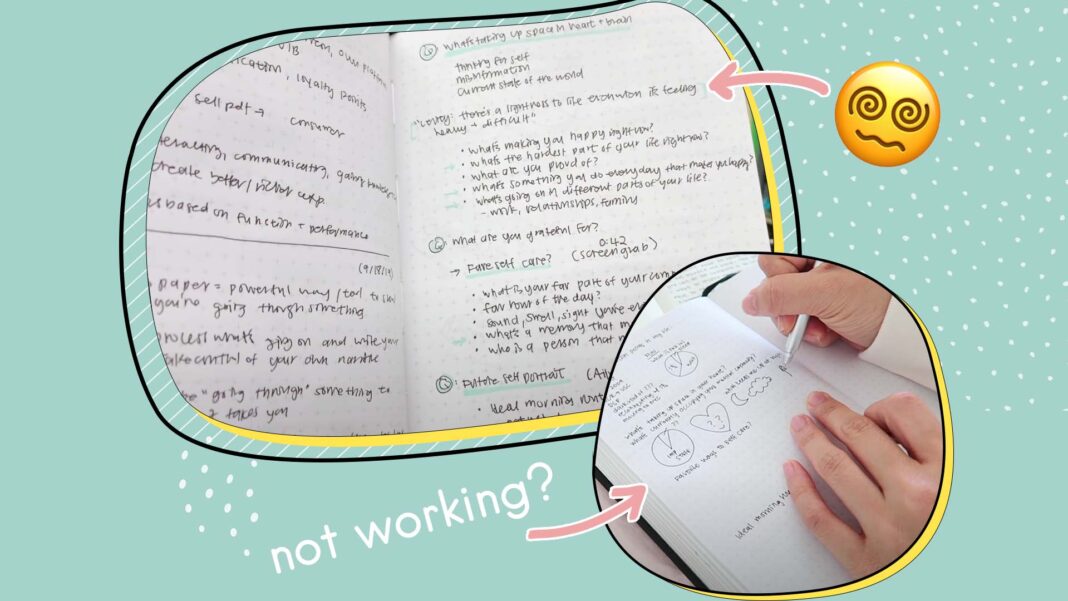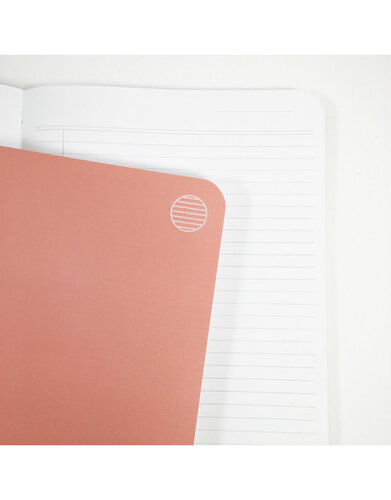
So let me guess… you’ve started journaling a couple of times but are still struggling with it. You’ve heard the benefits of journaling from friends, family, or on YouTube, looked through some blog posts on how to journal, or even read the book “Bullet Journal Method.” But for whatever reason, every time you tried, it just didn’t work for you! You feel slightly discouraged but think, “it might just be me!”
If this is you, you’re not alone! Because that is exactly how I feel about journaling too. And in this article, I’m going to share with you why journaling doesn’t work for you (and why it might not for you either) and two methods you can try instead to reflect on the day and keep your life organized.
Journaling has always been something I found really interesting to grasp. Don’t get me wrong! I do completely vibe with everything it stands for and its benefits for things like self-reflection, stress relief, and idea generation.
I find the act of writing to be pretty therapeutic, and it has the power to silence the chaos in our heads. Doing it consistently can help us spot behavioral or thought patterns in our inner world that we aren’t able to notice until we physically see them in front of our eyes.
But after trying multiple times over many years and over different stages of my life, I think I can finally and safely say that journaling isn’t for me, and I think it boils down to three main points.
How I Frame My Thoughts
The one big thing about journaling for many people is that it helps them brain dump. That is, whatever is filling their mind up, they’re able to express it in words, get it on paper, so it’s out of their brain. I have a lot of thoughts that go through my mind on a daily basis, whether it’s running through different situations, imagining new ideas, or trying to understand different perspectives.
But instead of feeling anxious or like I need to have it figured out, which can very easily lead to and start consuming your thoughts, I actually really enjoy the process of thinking. To me, life is just kind of like this endless number of case studies that we can learn from, whether that’s people or situations that happen.
Over the years, I’ve learned to know myself better and become more aware of my own capabilities. And all of those thoughts go on in my head quite quickly, and then I’m able to just be away with it. That’s why I don’t feel the need to jot down my thoughts.
Learning To Rationalize
In Buddhist philosophy, I learn to look at problems or tribulations, anything that moves us or evokes some sort of negative emotion, from a third-person perspective.
That way, I can look at myself and the feelings that I harbor around a certain person, a certain situation, or even about myself with a sense of distance. This gives me mental clarity and helps me rationalize and realize just how big or small a problem really is.
Since I learn to do that as things happen, it almost becomes redundant for me to go and write it down because sometimes I’ve already moved on by that point.
Building Deep Connections
The last point relates to deep connections and the outlets that we have with certain people in our lives.
I’m really thankful for the friends and family that I have because if I really do have something that’s on my mind that I just can’t figure out myself, I do have people who are also very introspective and who put a lot of focus on bettering themselves inside and outside.
Oftentimes, when I tell them what I’m struggling with, most people have gone through very similar things; it’s just in a different flavor.
Having someone to understand you, offer advice, and tell you the hard truths coming from a really good place is truly precious. Even though sometimes it might not be what you want to hear.
I think I’m very fortunate to have those people, and that’s the third reason why I feel like I don’t necessarily need journaling.
Alternatives to Journaling
1. Daily Planner
For me, I think a daily planner helps keep my day organized and productive. And you know, there’s real satisfaction in taking things off, and it helps empty my mind as well.
If you have school and you’re juggling a bunch of different things, everything can get so out of hand and out of whack in your head. So I find something like a daily planner, a catch-all notebook, or even the notes app on your phone super helpful.
This is my fave notebook for planning because the pages are thick enough that pens, highlighters, and colored pens don’t bleed through.
2. Meditation
The second and probably the most game-changing thing for me is meditation!
I do meditation for 30 minutes or one hour at night before bed. Basically, any time between my shower and before I sleep, because that is the time that I take for myself to filter through specific thoughts that come up.
What meditation teaches me is that you have all the power to control your thoughts, and it’s not the thoughts that control you. For me, it’s about realizing that I’m feeling certain things and then deciding whether or not those things are rationally worth thinking about or something that I can just discard. I think that’s powerful, and it’s basically mental journaling.
Lastly, I think it’s beneficial just to take one of these tasks at a time to get into it and decide whether it works for you. Don’t try to take on too many of these self-care acts, like trying to wake up early, trying to do your journaling, trying to do meditation all at once. It will drive you crazy, and you’ll be like, “okay, self-care is a sham because it’s causing me more stress.”
Let me know if you’re also on the same kind of wavelength as me where you tried journaling, and it just doesn’t work for you!
Watch the full video to learn more:
Shop all of our curated faves at: https://bwth.in/shop
Subscribe to our YouTube Channel for more information and product recommendations: https://bwth.in/subscribe







